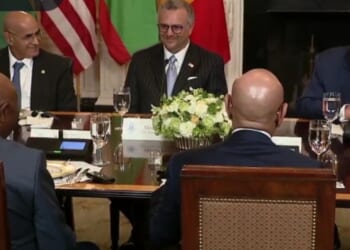Baroness Louise Casey’s report on grooming gangs in England and Wales is a careful and well-reasoned document that shines a damning light on a toxic culture of denial that enabled men of Pakistani and other Asian backgrounds to rape predominantly white girls with relative impunity. But in a recent interview on Sky News, Casey said something troubling. Referring to historic police case files from Rotherham, she said: “I found the word Pakistani Tipp-exed out and I thought whoever did that was inadvertently giving ammunition to the EDL.”
This was a reference to the English Defence League and its activism around grooming gangs, which was often ugly and divisive. Now there is much to be said about the EDL, which was disbanded in 2013, and what it did about the grooming gangs. But for Casey to confess that her first thought after coming across a piece of evidence that is indicative of a broader cover-up is to ponder how the EDL might stand to benefit from it suggests a rather strange ordering of priorities.
To be fair to Casey, she was responding to a question about whether the fear of being tarnished as a racist had caused the authorities to turn a blind eye to the grooming gangs; her point, although she didn’t quite put it in this way, was that in not wanting to appear as racist, the denialists were, in effect, helping other racists to exploit the issue because no one else — or no one good — was addressing it.
Casey’s core point, in isolation, is a valid and necessary one: the far-Right has indeed sought to gain political capital from the grooming gangs scandal, and it has been given a free rein in this in part because so many others have shied away from confronting the problem. But it’s also true that the preoccupation with how the grooming scandal might conceivably “play into the hands” of the far-Right has been just as corrosive and detrimental as the insidious imperative not to be seen as racist, with both intersecting to produce a culture of denial over the rape gangs.
Julie Bindel, for example, has recounted in UnHerd how, in 2006, The Guardian rejected her pitch about a story of a missing 14-year-old girl from Blackpool who had been targeted by abusers in the town. Bindel, who was one of the first journalists to write about grooming gangs, recalled that her then editor, Katharine Viner, told her: “We would be called racist if we publish this.” In another piece, retelling the same story, Bindel remembers Viner as saying: “The BNP [British National Party] are all over this and it will just add fuel to the fire if we go anywhere near it.” Despite Bindel’s insistence that neither she nor her sources were racist — that she was “a Left-wing feminist concerned about child sexual abuse” — The Guardian passed on the story and the Sunday Times Magazine took it on.
It is impossible to know how many other stories on the grooming gangs were abandoned because editors thought that the far-Right would use them to demonise Muslims and sow discord. It is similarly difficult to know how many writers deliberately avoided the issue or wrote about it in a highly selective way because they thought that anything they said about it might help the far-Right.
“It is impossible to know how many other stories on the grooming gangs were not taken up or abandoned.”
In The Fallout: How a Guilty Liberal Lost His Innocence, the Observer’s Andrew Anthony gives an unusually honest account of how, working as a journalist in the Nineties, he would occasionally “turn a blind eye to cultural practices that were problematic or difficult to reconcile with a liberal outlook”. He recalled how, in the course of writing a long feature about crime and policing in East London, he deliberately omitted to include a police officer’s comment about the high incidence of forced marriages and domestic violence among the local Muslim community. “I feared that it might be construed as anti-Muslim,” he wrote.
He also admitted that while working on another story, for which he had temped as a driver for a London minicab firm, he discovered that most of his fellow cab-drivers had been granted or were seeking asylum — or had been turned down. What struck him most about his new colleagues was the “cold contempt” with which they regarded their new home. “Some of the drivers were Taliban sympathisers, some were admirers of Ayatollah Khomeini, but none were pro-British,” he wrote, adding: “Almost none of this I chose to report.” “Why would I write anything that could be construed as a Mail-like attack on a minority?,” he explained, describing his thinking at the time. He also feared that sensationalist reporting on minorities would only serve to fuel hatred towards them.
It is hard to exaggerate just how prevalent and ingrained this mode of thinking is among progressives. George Orwell, writing in Tribune in June 1944, described it as a “sort of charm or incantation to silence uncomfortable truths”. “When you are told that by saying this, that or the other you are ‘playing into the hands of’ some sinister enemy, you know that it is your duty to shut up immediately,” he observed. He also conceded that “objectively” the charge can often be true — that “it is always difficult to attack one party to a dispute without temporarily helping the other”. But he was adamant that the suppression of unpleasant facts was damaging in the long run and that, as he argued in another essay, the cause of progress cannot be served by lies.
When Bindel’s Sunday Times Magazine investigation was published in 2007, she was roundly condemned by many of her comrades on the Left. A number of people told her that she was playing into the hands of the BNP. “I was truly staggered,” she recalled. “It would appear that I was being told not to wash dirty linen in public, and to hell with the rape and abuse of teenage girls.”
This brings us back to Casey and her implied suggestion that those who suppressed the truth about rape gangs were essentially good people whose motives were well-intentioned, while those on the far-Right who couldn’t keep off the subject were bad people animated by racism. One need not make a fetish of nuance to posit that this is a rather reductive way of looking at the matter, and it certainly flatters the spineless police officers and countless local officials who looked the other way because they didn’t want to displease their superiors or damage their career prospects. It is hard to think of these people as uniformly good. Equally, there are some on the far-Right, notably Tommy Robinson, whose rhetoric about grooming gangs has been incendiary, but who did seek, albeit ham-fistedly, to bring attention to the victims’ plight. Should people like him be seen as wholly bad?
Many would no doubt take issue with this characterisation of Robinson — Bindel has insisted that he is “not a man you would usually expect to be interested in the plight of young and abused women” and that his primary concern is to agitate against radical Islam. But might not both of these things be true — that Robinson is broadly motivated by an ideological hostility towards Islam, but also a glimmer of sympathy for the victims of the grooming gangs. Need one exclude the other?
Whatever the case, the temptation among our elites to invoke the spectre of the far-Right whenever the spotlight falls on Muslim rape gangs or jihadi terrorism, or indeed any activity that reflects badly on Muslims, is at best a distraction and at worst an attempt to shut down the kind of honest discussion that Casey’s report sets out.

















